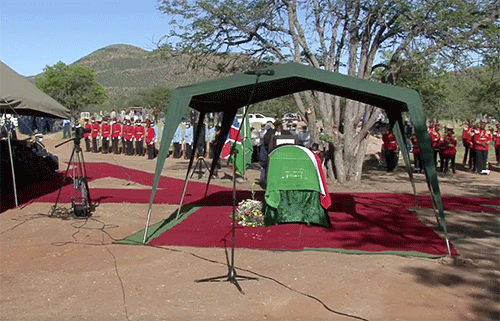Former cabinet minister and renowned Swapo activist Immanuel Ngatjizeko was buried on Saturday in his home village of Otjohorongo in the Omaruru constituency, Erongo region. Ngatjizeko died on 5 March at the age of 69.
The State burial, attended by Vice President Nangolo Mbumba, Prime Minister Saara Kuugongelwa-Amadhila, Chief Justice Peter Shivute, Swapo secretary general Sophia Shaningwa, and leader of the official opposition, Popular Democratic Movement (PDM) McHenry Venaani was marked by the national anthem and a 17-gun salute by the Namibian Defence Force (NDF).
The burial was also witnessed by Ngatjizeko’s family members, regional governors, senior government officials, foreign dignitaries, tribal chiefs and Namibians from all walks of life.
“It is said that good men must die, but death cannot kill their names. Today, we remember and mourn a good man, a man of impeccable character and an exemplar of grit, determination, and sacrifice.
“This is a man who was a son, a father, a brother, an uncle, a comrade and a friend. This is a man who we knew as Immanuel Uarotua Ngatjizeko. Death may have robbed us of his physical presence but it will never kill his name or rob us of the everlasting memories he has left behind,” said President Hage Geingob, whose message was delivered by Mbumba.
After completing his matric at Augustineum Secondary School in 1972, Ngatjizeko enrolled at Fort Hare University in South Africa, where he completed a Diploma in Commerce and Administration in 1974.
Geingob said while pursuing his studies towards a Bachelor of Commerce degree, Ngatjizeko’s academic ambition collided with destiny as the historic June 1976 Soweto student protest not only interrupted his studies but became a catalyst for uprising and revolution in South Africa and Namibia.
“The milieu at the time, exemplified by the events in Soweto, roused a fire inside the inner being of the young comrade Ngatjizeko, awakening an indomitable spirit and a burning desire to become a freedom fighter and join the struggle for Namibia’s independence,” Geingob said.
“And so he did, sacrificing the opportunity of further studies in order to join Swapo in 1976 as a political activist,” he added.
“To some, that price was giving up a job, giving up on education but to others, it meant leaving Namibia. To all that joined the struggle, it meant that you may have to pay the highest price of all – giving up your life,” Geingob said.
Ngatjizeko was elected to the Swapo executive committee of the Windhoek branch and shortly thereafter, to the Swapo national executive. Ngatjizeko served as the administrative and organising secretary of Swapo. After independence, he was elected to the Swapo central committee in 1991. He served as mayor of Windhoek from 1999 to 2000, before becoming a member of parliament in 2000 and joining cabinet in 2003. In 2007, he was elected to the Swapo politburo.
At the government level, Ngatjizeko served as a deputy minister of mines and energy, director general of the National Planning Commission (NPC) during the period of 2000 to 2005.
In 2005, he was appointed as the minister of trade and industry before taking up the portfolio of minister of labour and social welfare in 2008, a position he held until 2012 before becoming the minister of safety and security, and briefly minister in the presidency.



